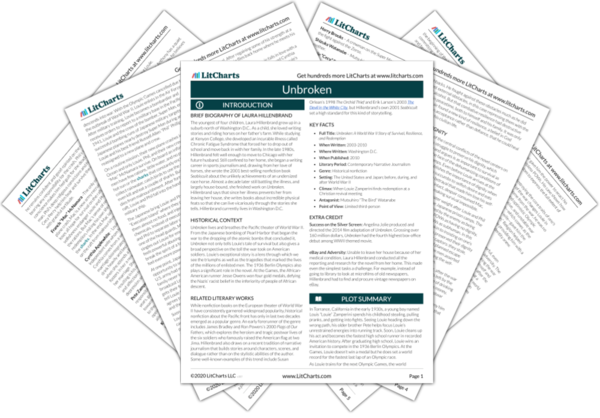Summary
Analysis
At the camp, Louie realizes that the prisoners have developed various ways of communicating with each other secretly. Men write notes on toilet paper and hide them in the latrines. They also communicate by tapping out Morse code on the walls. In an act of rebellion, most men fart when the guards force them to bow towards Emperor Hirohito. In another defiant act, Louie finds and keeps a journal of his experiences in the camp.
The POWs find ways to fulfill their human need to communicate, asserting their autonomy and humanity in the process. With his journal, Louie affirms his distinct individuality in the face of the dehumanizing conditions that threaten to eat away at his identity. These acts of defiance restore the men’s dignity, making life in the camp more tolerable.
Themes
When the guards learn that Louie was an Olympic runner they find a Japanese amateur runner to race him. Due to his ill health, Louie loses the race and becomes increasingly concerned about his failing strength. Louie goes to Jimmie Sasaki for help, who ensures that he will assist him, but ends up only providing him an egg and some fruit. The other prisoners are more of a help, giving him extra food and a better coat.
Louie’s conception of self is so wrapped up in his identity as an Olympic runner that losing the race means that he is beginning to lose his core essence. But even this loss doesn’t crush Louie – instead, he fights to regain to his strength and physical health, the bedrock of his identity as a runner.
Themes
When the guards arrange for another race, Louie feels well enough to win the race. With the cheers of the prisoners motivating him, he wins and the guards beat him for it. Louie feels that the victory was worth the beating.
Louie’s victory restores his identity as a champion runner. Defying the guards’ expectations, Louie’s achievement reminds him of the proud, unbeatable man he was before the war. But the victory is not only his own because it also gives the other POWs a moment of triumph over the guards, an experience that will help them preserve their human dignity.
Themes
In March 1944, the Japanese transfer Phil to a forced labor camp north of Tokyo. At the camp, Phil works in the terrible conditions of a copper mine. But the guards allow him to write home. A few days after giving a letter written for his fiancé Cecy to the guards, he finds the letter in a garbage heap, burned. The edges are charred, but his letter is still readable. Phil retrieves the letter and vows to deliver it to her in person after the war.
While Louie’s will to survive comes from the defiant assertion of his identity, Phil gains strength from his love for his fiancé. The letter could be understood as a metaphor for Phil’s own resilience – a little burned around the edge, he’s still alive and optimistic. Like the love letter itself, his love for Cecy cannot be so easily destroyed.
Themes
Get the entire Unbroken LitChart as a printable PDF.













